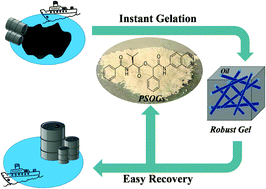Mandelic acid-derived organogelators: applications of their solid form in rapid and efficient remediation of marine oil spills†
Abstract
Rapid industrialization has dramatically increased the probability of chemical-induced water pollution, especially the frequent spillage of organic liquids and fossil oils, which has driven the development of powerful methods to deal with these problems. Direct application of phase-selective organogelators (PSOGs) in solid form is a practical and promising alternative for cleanup of organic liquid pollutants from contaminated water. However, reports on such materials are not many in number. Herein, two mandelic acid-derived organogelators have been developed to show phase-selective gelation behaviours towards organic liquids, product oils, and a type of Chinese crude oil via a heating-and-cooling process, stirring or resting operation in biphasic mixtures of water. Particularly, gelator 1b could selectively congeal all the tested organic solvents and oils in powder form from the oil/water mixtures. Moreover, 1b could gelate the crude oil within 30 s under a certain condition. The benefits of instant gelation performance, easy collection of the resulting gels, easy recycling of oils, and reusability of the gelator make 1b ideal for real-world emergency remediation of oil spills. Additionally, 1b was compounded with filter papers to fabricate gelator–matrix composites, providing another way to apply the gelator solid in efficient elimination of crude oil from water.



 Please wait while we load your content...
Please wait while we load your content...